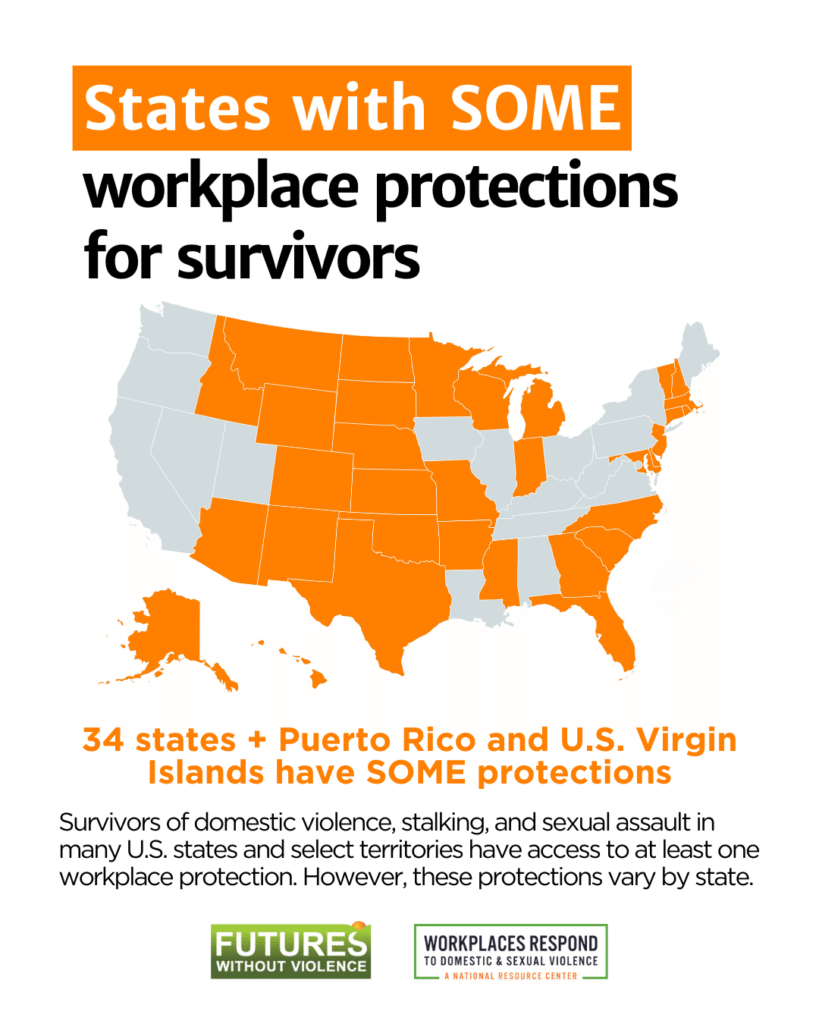Spreading Awareness About State Laws That Protect Survivors’ Employment
By Moira McLaughlin
October 30, 2025
Being a survivor of domestic abuse, sexual assault, and stalking comes with myriad challenges:
• Where can I go to be safe?
• How should I respond to my abuser’s gaslighting?
• Who can I trust?
And there are also a lot of lesser-known practical issues a survivor has to consider, too, around employment:
• Can I take time off to appear in court to obtain a restraining order?
• Can I ask my employer for a transfer?
• If I leave this job to get away from my abuser, can I file for unemployment?
According to a recent survey FUTURES conducted with the National Domestic Violence Hotline, 79% of domestic violence survivors, 35% of stalking survivors, and 27% of sexual assault survivors said that experiencing abuse disrupted their work.
State Laws Can Help
For survivors, economic security is key. And yet maintaining employment while experiencing abuse is not easy. That’s where state laws can come in.
“There are no federal laws that explicitly protect a survivor whose experience of domestic violence, sexual assault, or stalking impacts their ability to work,” said Bella Book, Senior Program Specialist & Program Attorney at FUTURES.
“Having state employment laws focused on the needs of survivors ensures that survivors aren’t unnecessarily choosing between reaching safety and a paycheck.”
And yet, often, survivors and their employers are not aware of the laws that exist that could help.
FUTURES’ Advancing Safety through Employment Rights Advocacy Project aims to change that.
“If a survivor in Arizona knows she can ask for paid time off to obtain legal services without losing her job, or a survivor in Nevada knows he can ask his employer for a new telephone number to make it harder for a stalker to contact him, these small supports can have big impacts on a survivor’s ability to stay safe and stay employed,” said Book, who is leading the project.



10 States and a Lot of Knowledge
After an application process, the project brings together attorneys, advocates, and survivors from 10 states: Florida, Maine, Oregon, California, Illinois, Missouri, West Virginia, Iowa, Pennsylvania, and Minnesota. With 45 participants and 10 teams, the goal is to increase awareness about the state laws that exist to protect survivors and also hear about how people are using the laws that do exist.
“The cohort is exciting because the states get to learn from each other,” Book said. “We can learn a lot from states with robust laws. And we can learn from folks who are being very creative and tenacious and working around legal barriers. It’s an opportunity for everyone.”
The cohort will meet three times together to learn, share information, and also create tools and resources for survivors: from fact sheets to templates for survivors to use to ask for time off.
“It’s a wonderful experience so far with the cohort,” said Raymie White, a lawyer with the West Virginia Coalition Against Domestic Violence who is on a team with an advocacy director, a development director, and another lawyer, all working in West Virginia domestic violence programs.
At the first cohort meeting, White said he filled his notebook with new ideas about how to train employers.
“How do we get the employers to listen to us, and how do we develop a training that’s beneficial? Because we may not have the laws on our side now, but that doesn’t mean we still can’t have an impact,” he said.
According to the survey FUTURES and the National Domestic Violence Hotline conducted, 52% of sexual assault victims and 36% of stalking victims surveyed reported that their employer did not provide them with any support related to the abuse.
With the cohort’s help, White hopes to “develop a way to really teach advocates how to support victims that are facing employment issues right now with the tools that are currently in place.”
Another participant, Noelle Polk Clark, a victim rights attorney in Florida, is on a team with a COO, a policy expert, and another lawyer, all working in domestic violence programs.
“It’s inspiring,” she said. She’s been thinking creatively of new strategies to use existing laws to help survivors and hopes to “keep reaching for more, and to be able to have some tangible tools and materials to help both directly with survivors and also in education with community partners.”
State Guide
FUTURES continues to increase awareness of state employment laws for survivors, training more than 1,500 people last year. With Legal Momentum, FUTURES created this State Guide on Employment Rights for Survivors of Domestic Violence, Sexual Assault, and Stalking.
“Right now, 82% of the country lives in a state with at least one survivor-specific employment law on the books,” Book said.
“Survivors who don’t know about these laws are making impossible decisions between their lives and their livelihoods. These 10 states participating in the cohort are leading the way for survivors to access a safer and more supportive future for the survivors they support.”



